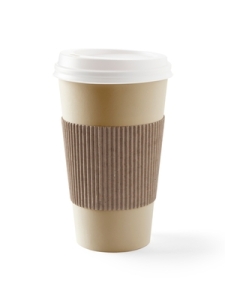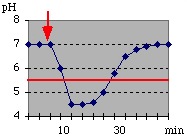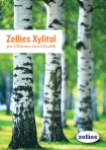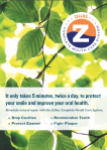Why “To Go” Drinks Damage Teeth
A few years ago I visited Paris and discovered, to my surprise, that take-out drinks were not readily available. The French appear to drink coffee seated at a table or the restaurant bar and don’t travel with drinks in hand or in a cup-holder (although Starbucks may initiate change)! If you cannot imagine such inconvenience or if you routinely enjoy portable drinks, read on and see how sipping could affect or damage your teeth.
Even Water!
Any drink (even water) dilutes the mineral-rich saliva that normally moistens your mouth and protects teeth. Dilute saliva has less tooth-healing and tooth-strengthening qualities. In a healthy mouth, undiluted saliva provides minerals that have the potential to reverse the damage that happens during normal eating or drinking. This instant repair process is the mechanism that keeps teeth strong and prevents cavities in a healthy mouth.
Breakdown and Repair – a Natural Process
Many things we eat and dink (even fruits and vegetables) cause minerals to dissolve from teeth, but fortunately we never get the chance to notice this damage, since saliva provides such a great repair system. Teeth soften in acidity (a process called de-mineralization) but minerals from saliva quickly replace any deficit (a process called re-mineralization). Breakdown and repair are good for teeth because the process allows healthy renewal of enamel. Our skeleton and muscles have a similar process of breakdown and repair to keep our bodies healthy and strong.
 Eating and Drinking
Eating and Drinking
Demineralization occurs to some extent whenever we eat or drink. Acids in food or drinks deplete minerals from teeth, and citrus fruits and juices are some of the most damaging. Any sugars, grains, tea-leaves, coffee, carbohydrates, and even vegetables can cause a de-mineralizing effect. This doesn’t mean you should stop eating or drinking, but limit the time that your teeth are exposed to damage and avoid snacking or continuous sipping as much as possible. If you have healthy, alkaline saliva it will wash away acidity and the minerals in saliva can naturally repair damage.
Acidic Saliva
People experience dental problems when they have insufficient saliva or if their saliva is mineral-deficient or acidic. This is because these mouths lack the normal acid-balance and repair mechanism. Acidic saliva can occur because of stress, poor nutrition, hormonal imbalance and with increasing age. Without healthy saliva, the mouth remains acidic and teeth have no way to repair daily damage. Those who believe that teeth can be maintained by diet alone forget this element of the puzzle – how do we help those with acidic saliva? Zellies mints and gum and the Zellies Complete Mouth Care System offer a great solution for such problems and are ideal for someone with a dry or acidic mouth.
Sipping Drinks

If a drink contains sugar, citrus flavors, or acids, sipping it can expose teeth to extended periods of acidity, disabling the natural repair process. The result is weakened enamel, recession, sensitivity, staining, calculus, or cavities. The amount of damage depends on the length of time teeth are exposed to acidity, but the damage can be serious and may occur quickly. If you love acidic drinks (even healthy ones like kombucha or tea!), it’s safest to drink them during a meal, and finish the meal with Zellies mints or gum, to minimize damage.
Studies and Graphs
Studies from the 1940s show it takes at least 30 minutes for saliva to balance mouth acidity after eating and drinking. Anydrop in mouth pH damages teeth and in Europe, graphs of these pH changes are printed on candy wrappers to explain why eating them damages teeth! If you understand the danger of prolonged mouth acidity, you realize why snacking or continuous sipping is a problem. If you snack or sip at short intervals (before saliva has had 30 minutes to balance acidity) your teeth remain in an acidic zone with insufficient time for repair. A simple act of sipping, instead of drinking during a meal, can create weak or thin enamel, sensitivity, cavities and stained enamel.
Zellies are here to help!
- Zellies stimulates a flow of alkaline saliva to quickly balance acidity
- Zellies stimulates saliva to help re-mineralize teeth.
- Zellies are the perfect mint to fight acidity and protect a dry mouth.
- Eat Zellies mints or gum after everything you eat or drink!
Remember: xylitol mixed in water will help reduce plaque in your mouth but it will not be as effective for re-mineralizing teeth as Zellies mints or gum eaten directly after snacks, meals and drinks.
Five Tips For Healthy Teeth
- Drink and eat at mealtimes – limit sipping and snacking.
- Test saliva often and try to understand your mouth acidity.
- Take drink-breaks, especially early afternoon, when saliva has the highest mineral-content.
- Good diet and a healthy digestion help improve the mineral quality of saliva.
- Use Zellies Complete Mouth Care System twice a day –always as the last thing before bed (since saliva flow is less, and more acidic, as we sleep).
How much liquid do we need each day?
We give sippy cups to toddlers; we take water bottles to the gym, school, work, walks – basically everywhere we go. We believing it’s important to keep ourselves hydrated, and I will not debate hydration here. If you want to explore this subject, here are links to thoughts from Dr. Tim Noakes and Dr. J Mercola.
http://www.stumptuous.com/waterlogged-tim-noakes
http://fitness.mercola.com/sites/fitness/archive/2012/07/13/athletes-drinking-too-much-water.aspx
——
Want to learn more about oral health? Click here to sign-up for our monthly e-guide!
——
Download our latest guidebooks for Ultimate Oral Health:
——
For more information on oral health and xylitol, please visit all of Dr. Ellie’s web-sites:

Zellies.com – learn more & order your Zellies Xylitol & the Complete Mouth Care System
Dr. Ellie.com – a great resource for learning more about oral health & Dr. Ellie
Dr. E Oral Health Coaching – articles, resources and videos to help you learn more
Join the conversation online on the Zellies Facebook page!



I’ve followed your program for a year now, but i did get a couple of cavities recently and I believe that sipping coffee all day is the problem.
Just a reminder – that “my program” is very specific and my recommendation is to keep all drinks ( especially sugary or acid ones) to meal times – and end every meal or snack with Zellies. This is the CORE of the program. You need at least 5 grams of xylitol each day on at least five separate occasions.
The suggested mouth rinses are to strengthen your teeth – and it is important to use the exact method and products at least twice a day. Always last thing before bed and also at a good time in the morning when the final rinse can strengthen your teeth. For anyone who follows “my system” like this – it would be virtually impossible for their teeth to deteriorate or for cavities to form.
If you really are using the system exactly like this – you may want a second opinion about those cavities.
According to a recent study even energy drinks are said to be harmful to teeth..
I cannot think of any drink ( except pH neutral or alkaline water) that is not harmful to teeth. This is why we suggest to drink at mealtimes and end the meal with Zellies mints or gum to protect teeth. If you need a coffee break or energy drink – have another Zellie mint after it. We have been warning about diet drinks, vitamin and flavored waters, and the acidity of apple juice and citrus for years.
Dr Phillips – I’ve just read your book and have started using your Complete Mouth Care System. I’ve been suffering from sensitive teeth for a few years and having just tested the pH of our drinking water I’m wondering if there could be a correlation. I’m in my thirties and had never had problems with my teeth until a couple of years after I moved from the north to the south of the UK. Our tapwater in the north was hard (presumably alkali?) whereas the pH of our tap water here is 5.5. We use a water filter and filtering seems to reduce the pH even further to 5.
I drink mostly water. Besides only drinking during meals and following meals with xylitol is there anything I can do to make my water more alkali (should I be adding xylitol to the water for example)? Thanks very much.
Although the water supply could be a contributing factor, your own saliva may also have been acidic during this time ( the stress of moving etc…). Most often mouth damage is the end result of a combination of factors, often aggravated by a dry mouth. If you suffered a sinus infection or allergies at that time, for example, the outcome for your teeth would have been made worse.
The protocol I recommend will help build back strength into your teeth. Also try to end every meal with xylitol if possible. Cheese is a food that truly appears to build strength into teeth – so this can be a great snack food, or an alternative to xylitol from time to time ( I eat cheese when I drink wine!) You may also want to read my blog about sipping drinks – since this warning applies to all drinks – including water. Mineral-rich saliva is the best healer of teeth – and constantly diluting saliva occurs as someone sips ( even water) during the day. The quality of our saliva varies by day and night – being at its worst quality for teeth during the night and at its best in the early afternoon.
This is why I suggest eating a healthy lunch, end with some xylitol ( or cheese) and then do not eat or drink for a couple of hours after lunch – let your teeth have direct interaction with un-diluted natural saliva. Also ensure your digestion is as healthy as possible – and if not, maybe consider adding more fermented foods ( like live organic yogurt) or maybe a probiotic in the form of a pill ( in the US I recommend Garden of Life Raw Probiotics for Men/Women)
I am happy that you have discovered this preventive approach. The worst thing you can do is rely on toothpastes or rinses for “sensitive” teeth – which simply take away symptoms, without addressing or correcting the problem – which is always too much mouth acidity.
If I consume Xylitol after consuming a fermented beverage, what effect will the Xylitol have on the probiotics in my stomach from the fermented beverages? Does Xylitol interact in a good way? in a bad way? no interaction? with the probiotics In my gut from the fermented beverages? Thanks for clarifying!!
Great advice and dicussion here. Sodas and high acidic foods etc all lead to erosion for sure. You hsare excellent tips here. Clearly a healthy diet rich in phytonutrients will help but your tips on prevention and use of Zellies is great. Thanks for posting this!
Dan.
Many people are confused at fist and find it hard to believe that “healthy” juices and “healthy” vegetables or teas could possibly be a problem for their teeth. I am very encouraged by the responses from my blog posts, and obviously with a little more explanation of the science – people truly “get” what xylitol/Zellies can do. I see this blog as a great way to share more of these complicated ideas. Please stay tuned!!
Dr Ellie – Since Xylitol inhibits the growth of strep bacteria, will Xylitol “negate” any probiotics I’ve ingested with kombucha (or water kefir, or milk kefir)? I’ve been concerned about the effects of these fermented drinks on my teeth and am so glad you’ve addressed this issue! Thanks.
Xylitol actually feeds all mouth bacteria – it does not “kill” them. Xylitol promotes a healthy flora (mix of bacteria) in the mouth – which is very important – and so some people will refer to xylitol as a pre-biotic. It is when harmful plaque bacteria “consume” xylitol, that its amazing effects are seen. Plaque bacteria cannot process xylitol and so (over time) they run out of energy. This makes plaque unable to produce acids ( to damage teeth) and unable to form sticky threads (that glues plaque to teeth). This allows you to clean your teeth more thoroughly as they wash away with a good mouth rinse.
So enjoy fermented foods and drinks, but be aware that they can be acidic and that the acidity may damage your teeth. The best advice is to avoid prolonged sipping of any drinks – keep them to meal times if possible, and end every meal, snack and drink with Zellies!
If I consume Xylitol after consuming a fermented beverage, what effect will the Xylitol have on the probiotics in my stomach from the fermented beverages? Does Xylitol interact in a good way? in a bad way? no interaction? with the probiotics In my gut from the fermented beverages? Thanks for clarifying!!
I think it’s safe to say that soft drinks, coffee or energy drinks are going to do a bit more damage over an extended period of time, which is another reason to minimize the size of your beverage (never mind the sugar!) The less you have to drink the sooner it will be gone.
Does sipping xylitol water have a similar diluting effect on “mineral-rich saliva that normally moistens your mouth and protects teeth”?
If your saliva is acidic in between “Zellies exposures”, will plain pH neutral or slightly alkaline water be somewhat effective (and therefore beneficial) at reducing the acidity, if only temporarily?
Thanks. The 30 minutes thing was new to me, though if it’s been around since the 1940s, it clearly isn’t new. The Noakes book is an amazing tome. I’m nothing resembling an athlete, but I find it interesting that both the need for hyper-hydration and the need for carb loading for athletes have been questioned recently.